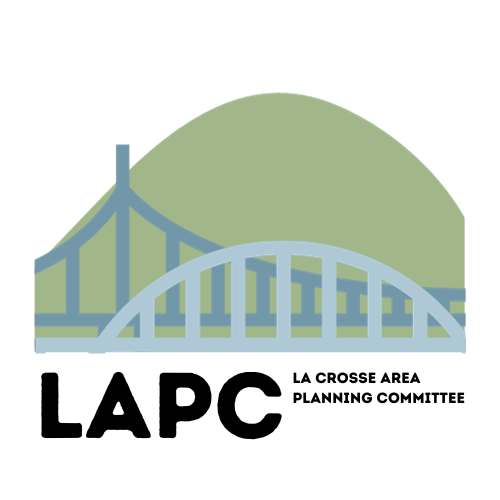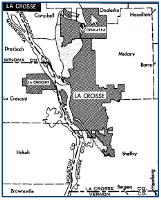-
HOW DO I
Apply For
Find
Pay
Water Testing

-
RESIDENTS
Health & Wellness
Senior & Assisted Living
Environment
Families & Individual Support
Financial Assistance
Library
Safety & Justice
Broadband

-
BUSINESS
Community Development
GIS Mapping
Ordinances
Requests For Proposals
Start A Business
Zoning, Planning & Land Information
Broadband

-
VISITORS
Campgrounds & Shelters
Downtown Guide
Hunting & Fishing
Parks/Facilities
Explore La Crosse

-
YOUR GOVERNMENT
County Board
Ordinances
Resolutions
Elections
Elected Officials
State
Facilities
Municipalities: Cities, Villages and Towns
- CITY OF LA CROSSE
- CITY OF ONALASKA
- TOWN OF BANGOR
- TOWN OF BARRE
- TOWN OF BURNS
- TOWN OF CAMPBELL
- TOWN OF FARMINGTON
- TOWN OF GREENFIELD
- TOWN OF HAMILTON
- TOWN OF HOLLAND
- TOWN OF MEDARY
- TOWN OF ONALASKA
- TOWN OF SHELBY
- TOWN OF WASHINGTON
- VILLAGE OF BANGOR
- VILLAGE OF HOLMEN
- VILLAGE OF ROCKLAND
- VILLAGE OF WEST SALEM
School Districts


About Us

Introduction
The La Crosse Area Planning Committee (LAPC) is the designated Metropolitan Planning Organization (MPO) for the La Crosse, WI-La Crescent, MN Urbanized Area. MPOs are designated for urbanized areas of 50,000 or more in population to carry out the metropolitan transportation planning process as established in 23 CFR 450 and to provide a forum for local decision-making on transportation issues of a regional nature. The designation must be agreed upon by the governor (in our case, the governors of Wisconsin and Minnesota) and the local units of government that together represent at least 75 percent of the affected population (including the largest incorporated city, based on population, as named by the Bureau of the Census).
History
The La Crosse Area Planning Committee (LAPC) was formed in 1966 by intermunicipal agreement as a regional planning committee to develop an areawide transportation study. Its duties were expanded in 1967 to include comprehensive plans.
The 1970 Decennial Census established the La Crosse (Wis.-Minn.) Urbanized Area--population 63,373--which consisted of the cities of La Crosse (population 51,153) and Onalaska and parts of the towns of Campbell and Shelby in La Crosse County, WI; and the then-village of La Crescent and part of the township of La Crescent in Houston County, MN. As a result of the urbanized area (UA) delineation, the LAPC was then designated by the governors of Wisconsin and Minnesota as the metropolitan planning organization for the UA.
The planning area for the MPO must include the UA and additional land anticipated to urbanize over the next 20 years. The current urbanized and planning area boundaries were adjusted and approved in 2023-2025.
Scope and Responsibilities
As required by 23 CFR 450.300, the purpose of metropolitan transportation planning and programming is to:
- Carry out a continuing, cooperative, and comprehensive performance-based multimodal transportation planning process, including the development of a Metropolitan Transportation Plan (MTP) and a Transportation Improvement Program (TIP), that:
- Encourages and promotes the safe and efficient development, management, and operation of surface transportation systems to serve the mobility needs of people and freight;
- Fosters economic growth and development; and,
- Takes into consideration resiliency needs, while minimizing transportation-related fuel consumption and air pollution.
- Encourage continued development and improvement of metropolitan transportation planning processes guided by the planning factors (23 CFR 450.306).
Additional LAPC activities that inform and support the planning process include but are not limited to:
- Coordinating with the Wisconsin and Minnesota Departments of Transportation and public transportation agencies in the development of performance targets.
- Integrating State and transit agency goals, objectives, performance measures, and targets into LAPC planning documents.
- Coordinating with the Mississippi River Regional Planning Commission (MRRPC) in the development of a Coordinated Public Transit-Human Services Transportation Plan.
- Developing annually a Unified Planning Work Program that:
- Documents LAPC activities performed with federal and state planning funds.
- Discusses planning priorities facing the planning area.
- Providing technical assistance to local governments in the planning area.
To learn more about what we do and about metropolitan planning organizations in general, please view this presentation we gave for the Community Transportation Academy sponsored by 1000 Friends of Wisconsin.
Cooperative Agreements
To assist in carrying out the continuing, cooperative, and comprehensive performance-based multimodal transportation planning process required of MPOs, the LAPC has agreements with its member communities, the Wisconsin and Minnesota DOTs, and public transportation operators.
Intermunicipal Agreement for Metropolitan Planning Organization (2021)
Cooperative Agreement for Continuing Transportation Planning (WisDOT/LAPC/MTU, 2017)
MOU between MnDOT/LAPC/MTU (2022)
LAPC Staff:
Have any questions or something to share? Let us know!
Bob Gollnik, Executive Director
Phone: 608-785-5977
Email: [email protected]
Erin Duffer, AICP, Transportation Planner
Phone: 608-785-5597
Email: [email protected]
Travis Key, Transportation Planner
Phone: 608-789-8548
Email: [email protected]
© 2025 La Crosse County. All Rights Reserved.
